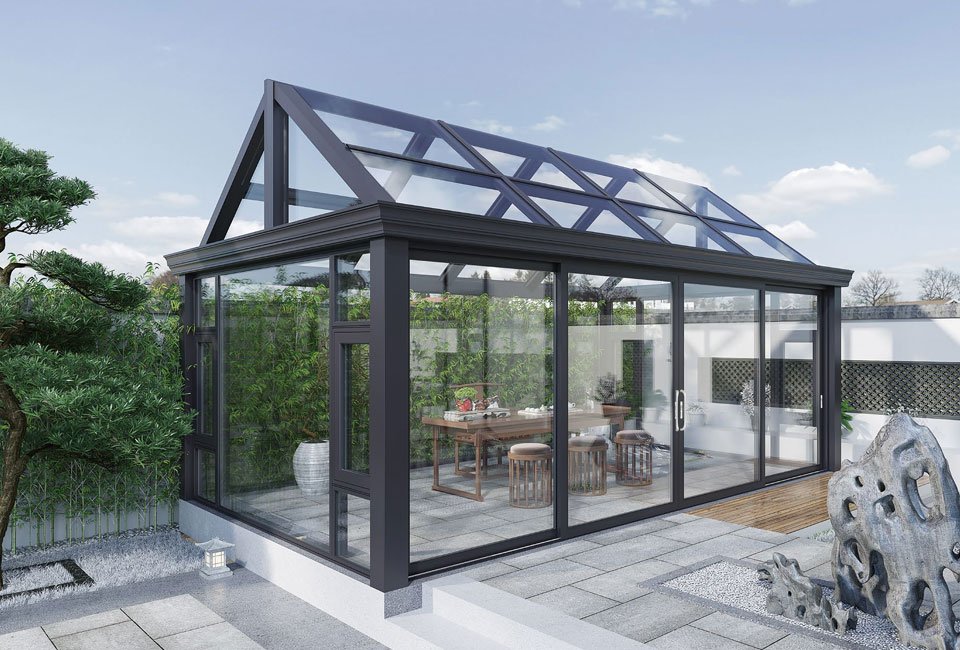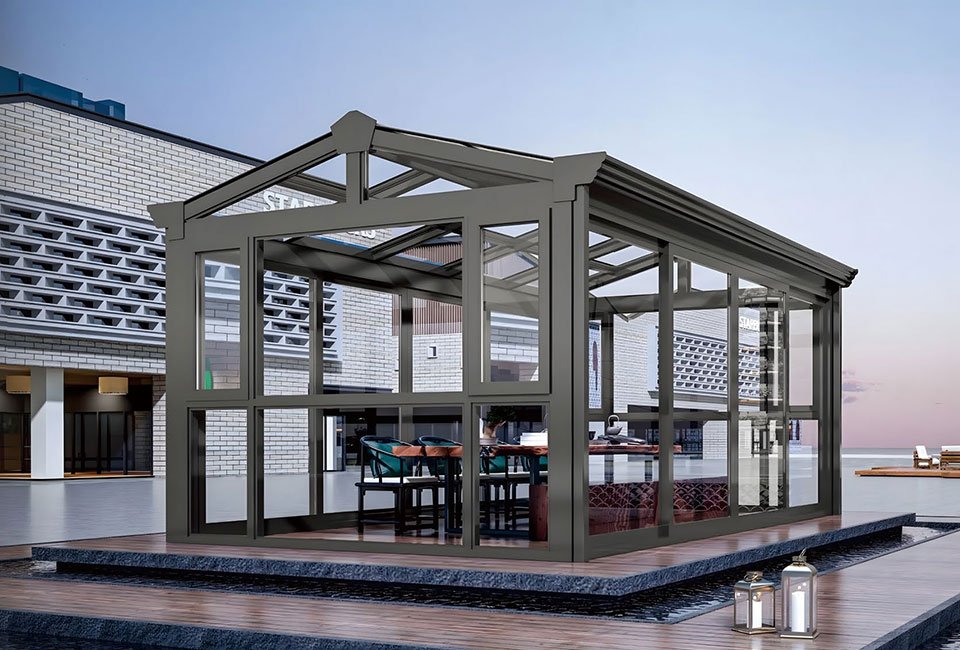When considering the addition of a sunroom to your home, choosing the right material for its frame is crucial. Two of the most popular options for sunroom construction are aluminum and vinyl. Each has its own advantages and drawbacks, so it’s important to understand the differences to make the best decision for your needs. Here, we’ll break down the benefits and drawbacks of both aluminum and vinyl sunrooms to help you make an informed choice.

1. Durability and Strength
Aluminum
Aluminum is known for its strength and durability. It is a lightweight yet strong material that can withstand harsh weather conditions, including high winds, heavy snow, and rain. Aluminum frames are resistant to rust and corrosion, especially if treated with a protective finish. However, in areas with high humidity or salt exposure (near oceans), aluminum can still develop corrosion over time if not properly maintained.
Vinyl
Vinyl is a more flexible material than aluminum, making it less prone to cracking under extreme weather conditions. However, it is generally not as strong as aluminum and may not be as suitable for areas with extreme weather conditions. While vinyl doesn’t rust, it can warp or degrade over time due to sun exposure, especially in regions with high temperatures. Higher-end vinyl materials are treated to be UV-resistant, but lower-quality options can yellow or fade with age.
Verdict: Aluminum wins in terms of overall strength and durability. It’s ideal for areas with harsher weather.
2. Energy Efficiency
Aluminum
Aluminum tends to conduct heat and cold more than vinyl, making it less energy-efficient on its own. However, many modern aluminum sunrooms come with a thermal break, an insulating barrier that reduces the transfer of heat and cold between the inside and outside. This feature significantly improves its energy efficiency, though it’s still not as effective as vinyl.
Vinyl
Vinyl frames offer excellent insulation due to their non-conductive nature. They do not transfer heat or cold easily, making vinyl sunrooms more energy-efficient and better at maintaining a comfortable temperature throughout the year. Vinyl’s insulating properties can help lower heating and cooling costs, making it an attractive choice for homeowners looking to reduce energy consumption.
Verdict: Vinyl is generally more energy-efficient than aluminum due to its superior insulation.
3. Aesthetics and Design
Aluminum
Aluminum frames are known for their sleek, modern look. They are available in a wide range of colors and finishes, and their slim profile allows for larger windows, which enhances the view and allows more natural light into the sunroom. Aluminum frames can be designed to match the architectural style of many homes, especially contemporary designs.
Vinyl
Vinyl frames have a bulkier appearance due to their thicker profile, which may not be as appealing for some homeowners looking for a sleek, modern look. However, vinyl frames come in a variety of colors, and some options even mimic the appearance of wood, offering a traditional look. While vinyl sunrooms can have a pleasant aesthetic, the bulkier frames may limit the size of windows and views compared to aluminum.
Verdict: Aluminum wins in terms of aesthetics for its slim profile and sleek design, providing larger windows and better views.
4. Maintenance and Care
Aluminum
Aluminum frames require minimal maintenance. They are resistant to rust and are relatively easy to clean. However, aluminum frames do need to be checked periodically for any signs of corrosion or damage, especially in coastal areas. The finish or coating on aluminum may require reapplication over time to maintain its appearance.
Vinyl
Vinyl frames are very low maintenance. They don’t require painting or sealing, and they resist fading, peeling, or cracking. Simply cleaning them with soap and water is enough to maintain their appearance. The only potential issue with vinyl is that, over time, it can become discolored due to prolonged sun exposure, especially in areas with high UV levels.
Verdict: Vinyl is the winner in terms of ease of maintenance due to its low-maintenance nature.
5. Cost
Aluminum
Aluminum sunrooms tend to be more affordable initially. The material itself is less expensive than vinyl, and installation can often be less costly as well. However, some aluminum sunrooms may require additional features (like thermal breaks) to enhance their energy efficiency, which can increase the overall cost.
Vinyl
Vinyl sunrooms tend to have a higher upfront cost due to the more expensive material. However, because vinyl is energy-efficient and low-maintenance, you might save money in the long run with reduced heating and cooling costs and fewer repairs. Additionally, vinyl sunrooms may increase the resale value of your home, which can offset the initial investment.
Verdict: Aluminum is generally more affordable upfront, but vinyl can offer better long-term value due to energy savings and low maintenance.
6. Environmental Impact
Aluminum
Aluminum is a highly recyclable material, making it an environmentally friendly option for those concerned about sustainability. The recycling process for aluminum is efficient and requires much less energy than creating new aluminum. Additionally, the longevity of aluminum frames means fewer replacements are needed, reducing waste over time.
Vinyl
Vinyl is a petroleum-based product, which means it has a higher environmental impact during production compared to aluminum. However, vinyl frames can also be recycled, though the process is not as widely available as with aluminum. Vinyl’s long lifespan, coupled with its low-maintenance nature, helps reduce the environmental impact over time by reducing the need for frequent replacements.
Verdict: Aluminum is more environmentally friendly due to its higher recyclability and lower impact during production.

7. Conclusion
When deciding between aluminum vs. vinyl sunrooms, there are several factors to consider:
- Aluminum is a better choice if you’re looking for a strong, durable, and sleek sunroom with larger windows and better views. It’s perfect for areas with extreme weather conditions but may require more maintenance and less energy efficiency.
- Vinyl is a better option if energy efficiency, low maintenance, and affordability are your top priorities. It offers great insulation, is easy to maintain, and can reduce heating and cooling costs over time. However, it has a bulkier design and may not be as suitable for extreme weather conditions.
At Delanshini Doors and Windows, we offer high-quality aluminum and vinyl sunroom solutions tailored to your needs. Whether you prioritize durability, aesthetics, or energy efficiency, our expert team is here to help you design the perfect sunroom for your home. Please contact us at wang@gddlsn.com.
Product Comparison & Buying Guides
Aluminum vs. Vinyl Windows: Which Offers Better Energy Efficiency?
Aluminum vs. Vinyl Windows: Which is Right for You?
Aluminum vs. Vinyl Sunrooms: Which One is Better?
Vinyl or Aluminum Sliding Doors – Which is Best?
Aluminum Casement Windows vs. Other Window Types: A Comparative Analysis
Comparison Guide: Casement Windows vs Double-Hung Windows
Bay vs. Bow Window: How Should I Choose?
